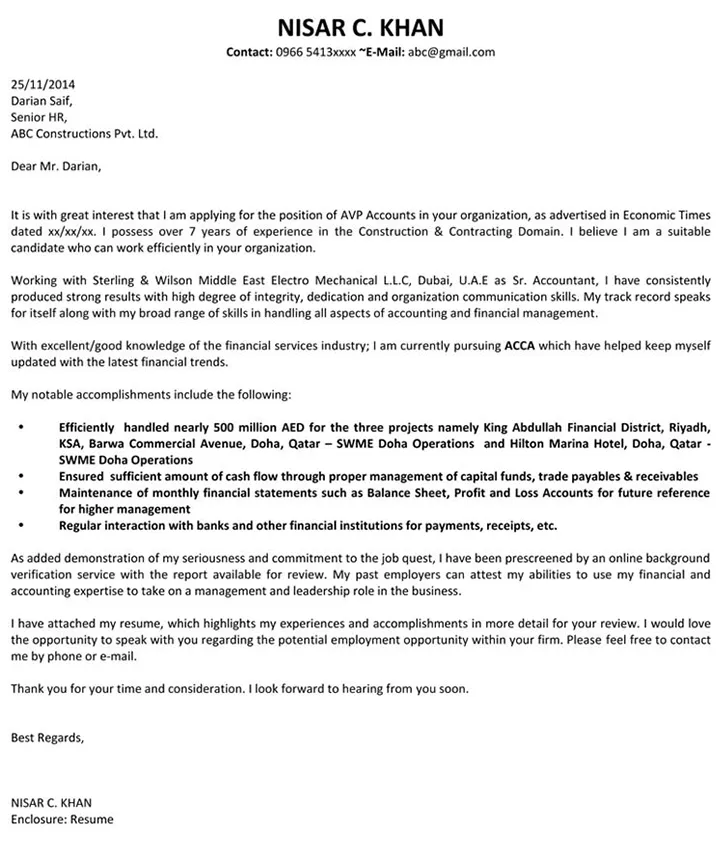Why You Need a Finance Cover Letter
In the competitive world of finance, a well-crafted cover letter is your key to unlocking the door to your dream job. It’s more than just a formality; it’s your opportunity to make a strong first impression and set yourself apart from the countless other applicants. Your resume provides a snapshot of your experience and skills, but a cover letter allows you to showcase your personality, passion, and genuine interest in the role and the company. It provides the context that a resume often lacks, helping the hiring manager understand why you’re the perfect fit. A compelling cover letter quickly grabs the attention of the hiring manager, highlights relevant skills and experience, and demonstrates your understanding of the company’s needs and your enthusiasm for the opportunity. In essence, it’s your chance to tell a story beyond the facts and figures presented in your resume, making you memorable and increasing your chances of landing an interview.
Key Elements of a Strong Finance Cover Letter
A successful finance cover letter is a carefully constructed document. It needs to be informative, persuasive, and error-free to impress hiring managers. The best finance cover letters have several key elements in common. First, they are tailored to the specific job and company, demonstrating that you’ve taken the time to understand their needs and values. They clearly articulate your relevant skills and experience, using specific examples to showcase your achievements. Moreover, they highlight your understanding of the finance industry and your enthusiasm for the role. Finally, a strong cover letter is concise, well-organized, and free of errors. It adheres to professional formatting standards. By including these crucial elements, you’ll create a cover letter that not only gets noticed but also positions you as a top candidate for the finance position.
Your Contact Information and Date
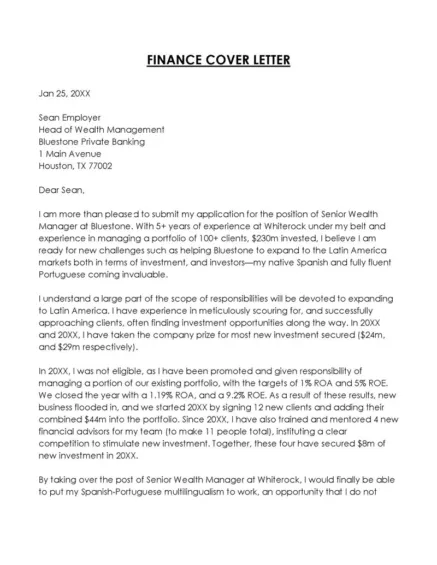
Start your cover letter by including your contact information at the top. This typically includes your name, address, phone number, and professional email address. Ensure your email address is professional and appropriate. Below your contact information, add the date. This ensures that the hiring manager knows when the letter was written. Aligning your contact information to the left and the date to the right is a common and professional format. Make certain the contact information is accurate and up-to-date so that the hiring manager can easily reach you if they are interested in your profile. Using a clear and readable font will make your information easily accessible.
Professional Greeting
The greeting sets the tone for your cover letter. When possible, address the hiring manager by name. Researching the hiring manager’s name can make a big difference in showing that you have taken the time to understand the company and are interested in this specific role. Using ‘Dear Mr./Ms. [Last Name]’ is a standard and professional approach. If you are unable to find a specific name, ‘Dear Hiring Manager’ is acceptable, but try to avoid generic greetings like ‘To Whom It May Concern.’ This personalized approach adds a touch of professionalism and shows that you’ve done your homework. It signals to the hiring manager that you are serious about the position and have put effort into your application, setting a positive tone from the start.
Highlighting Your Skills and Experience
This is where you bring your resume to life. Don’t just repeat what’s on your resume; expand on it. Focus on the skills and experiences that are most relevant to the job description. Tailor your examples to show how your skills and experiences align with the requirements of the role. Use strong action verbs to describe your accomplishments and responsibilities. Instead of just listing your duties, explain how you achieved results. For example, if the job requires financial modeling skills, describe a specific project where you successfully built and used a financial model. Explain your thought process and the positive outcome. By showcasing your expertise in a clear, compelling way, you demonstrate your capability and provide tangible evidence of your value to the potential employer.
Quantifying Your Achievements
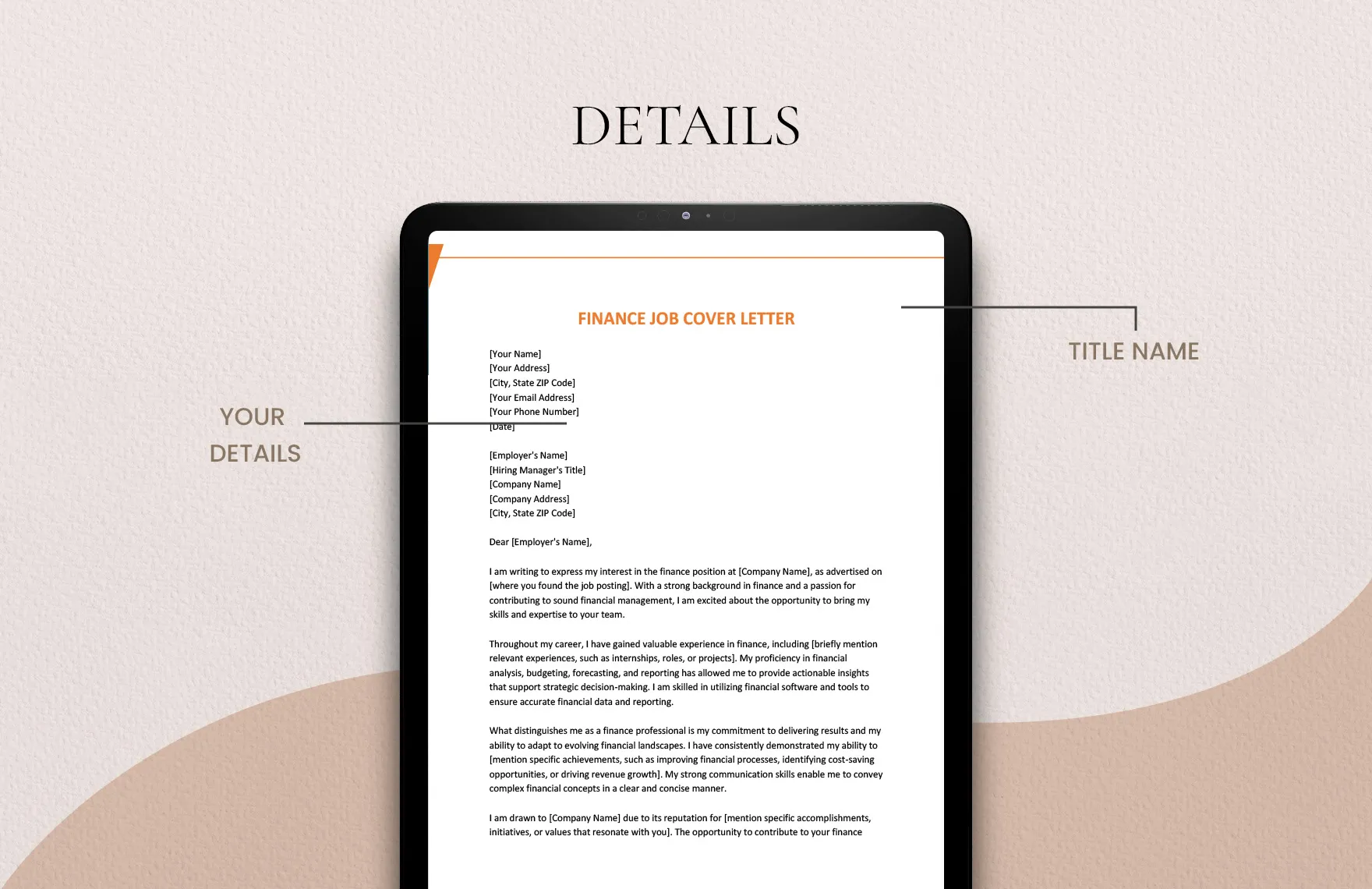
Quantifying your achievements is critical for demonstrating the impact of your work. Numbers speak louder than words. Wherever possible, use data to show the results of your actions. Instead of saying, ‘Improved efficiency,’ say, ‘Improved efficiency by 15% through process optimization.’ If you saved the company money, state the amount. If you increased revenue, provide the percentage or dollar figure. By quantifying your achievements, you give the hiring manager concrete evidence of your skills and abilities. This makes your claims more credible and helps the hiring manager quickly assess your value. This is a crucial step to make your accomplishments more significant.
Tailoring Your Letter to the Job Description
Generic cover letters are easily spotted and often discarded. Take the time to customize your cover letter for each job you apply for. Start by carefully reading the job description and identifying the key skills and qualifications the employer is seeking. Then, tailor your letter to directly address those requirements. Highlight your relevant experiences and skills and use keywords from the job description. This shows that you understand the role and have the specific qualifications the employer is looking for. Tailoring your letter is an investment of time that significantly increases your chances of getting an interview. This level of effort demonstrates your commitment to the position and your genuine interest in the company.
Demonstrating Your Knowledge of the Company
Show the employer that you’ve done your research. Before writing your cover letter, learn about the company’s mission, values, and recent achievements. Mentioning specific company projects or initiatives in your cover letter shows that you are genuinely interested in working there. This also indicates you’re not just sending out a generic application. You can research the company’s website, social media, or recent news articles. In your letter, you might reference a specific project that resonates with your skills or align with your professional goals. Mentioning the company’s values and how they align with your own shows that you see yourself as a fit within their culture. This helps you stand out as a thoughtful candidate, demonstrating your interest in the company beyond just the job itself.
Expressing Your Enthusiasm and Interest
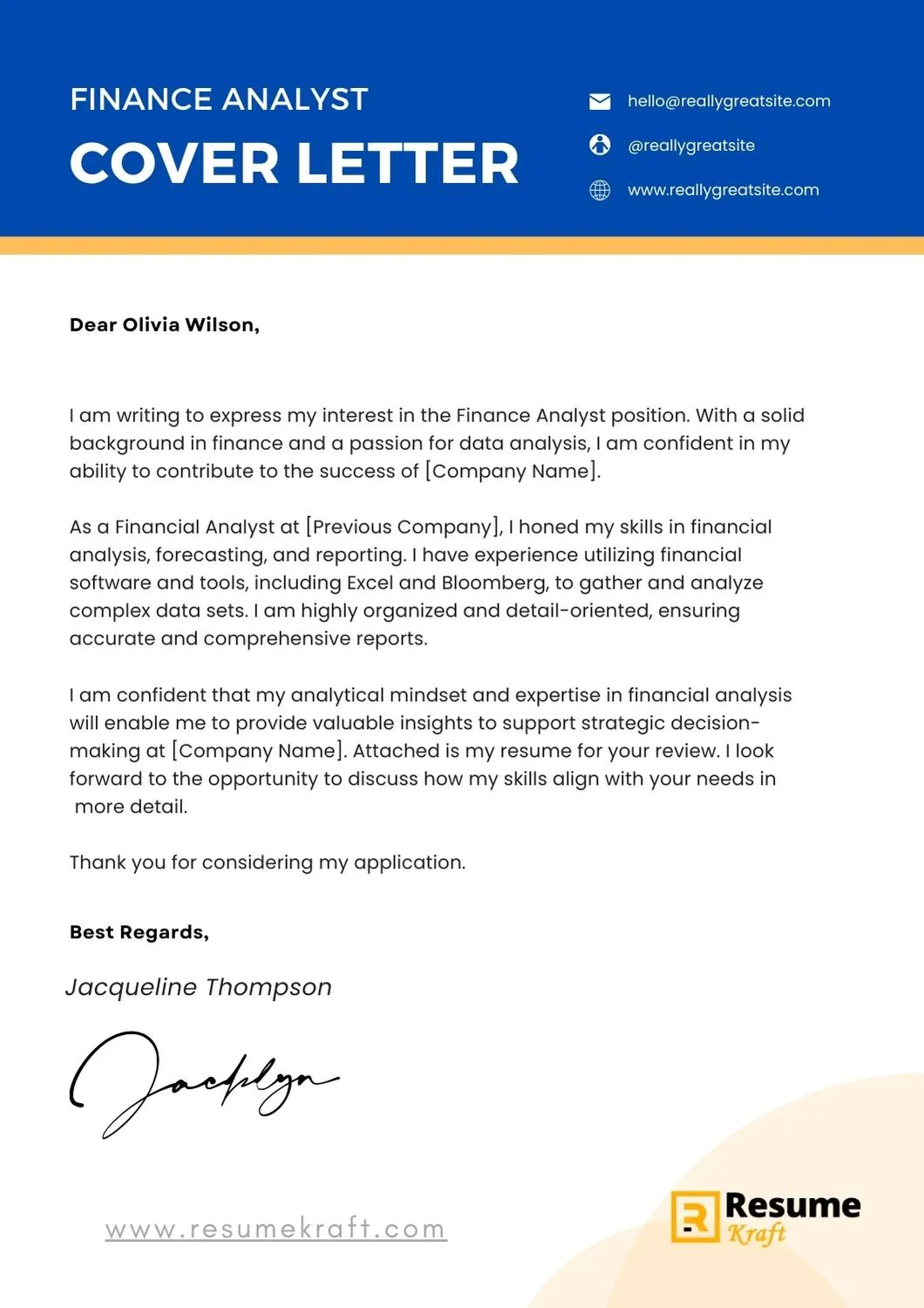
Express your genuine enthusiasm for the position and the company. State why you are excited about the opportunity and what motivates you to apply. Your passion is contagious. Briefly explain what attracts you to the role and why you believe you would be a good fit. This can be through detailing how the role allows you to utilize your skills, contribute to the company’s success, or advance your career goals. Conclude your letter by reiterating your interest and expressing your anticipation for the opportunity to discuss your qualifications further. This enthusiasm can leave a lasting positive impression on the hiring manager, helping them to remember you among other candidates. It shows you are proactive and willing to contribute to the organization’s long-term objectives.
Proofreading and Editing Your Cover Letter
Errors can quickly undermine your credibility, so always proofread your cover letter meticulously. Check for grammar, spelling, punctuation, and formatting errors. Even a single mistake can make you seem careless or unprofessional. Read your letter aloud to catch awkward phrasing or sentences that don’t flow well. Consider asking a friend, mentor, or career counselor to review your letter. A fresh pair of eyes can often spot errors that you might have missed. Ensure that your tone is professional and that your writing is clear and concise. A well-written, error-free cover letter demonstrates attention to detail and professionalism, leaving a positive impression and increasing your chances of success.
Finance Cover Letter Examples for Different Roles
Different finance roles require different skill sets and experiences. Tailor your cover letter to the specific position. Here are examples for Financial Analyst, Accountant, and Finance Manager. Each role requires highlighting a different combination of skills and experiences. Carefully review the job description and use keywords from the posting. Highlight the specific skills and experiences that the employer has requested. By tailoring the cover letter to the individual role, you increase your chances of being selected for an interview. Using an example that is specifically targeted to the role demonstrates your understanding of the requirements of the position and your commitment to excellence.
Financial Analyst Cover Letter Example
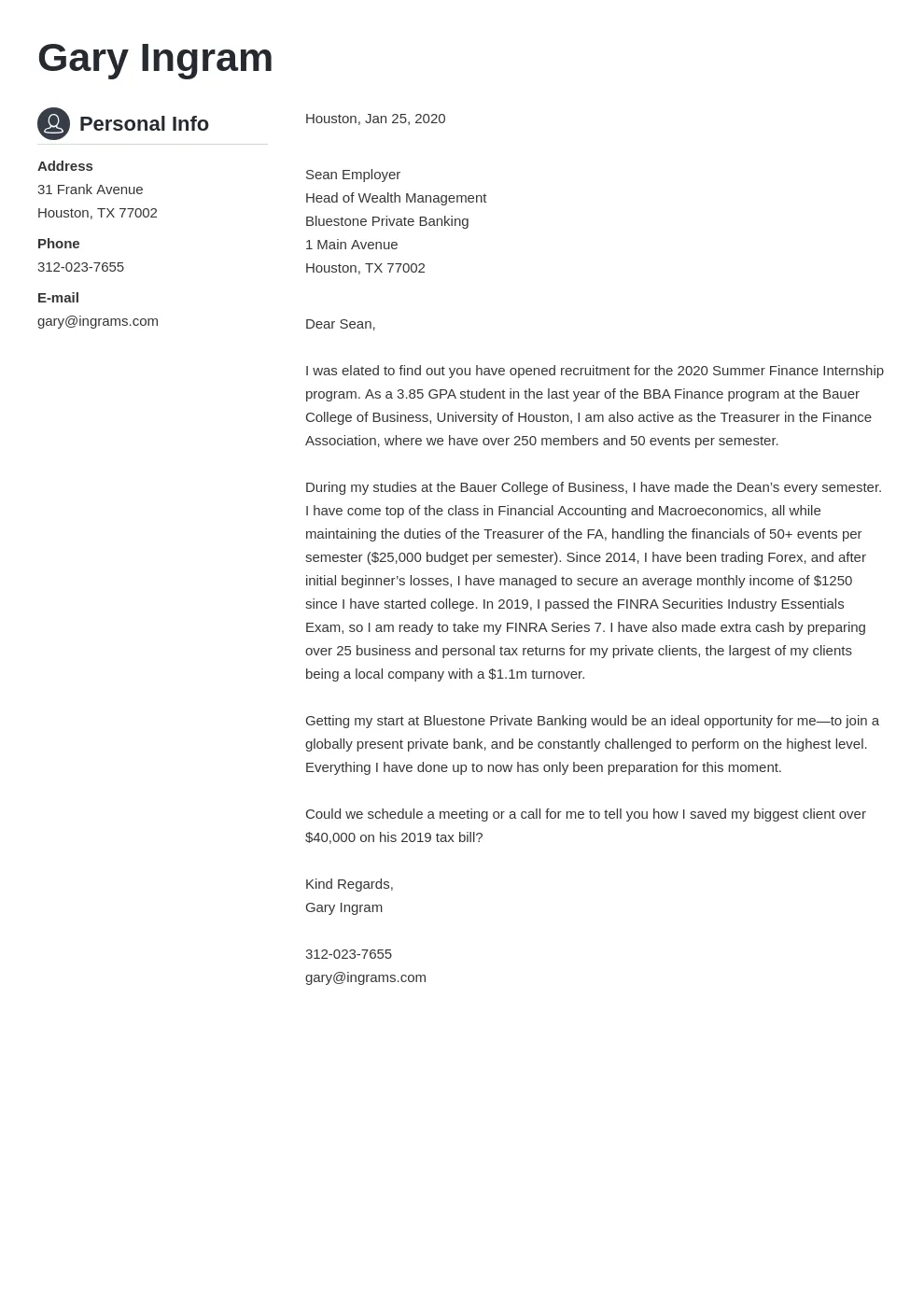
A Financial Analyst cover letter should highlight skills in financial modeling, forecasting, and data analysis. Emphasize experience in creating financial reports, analyzing market trends, and providing investment recommendations. Be sure to mention any relevant software skills, such as experience with Excel, financial modeling software, and data visualization tools. If you have experience working with large datasets, highlight this, as well as any experience with financial regulations or compliance. Be sure to quantify your achievements. For example, describe how you improved the accuracy of financial forecasts or contributed to a successful investment strategy.
Accountant Cover Letter Example
An Accountant cover letter should highlight experience in accounting principles, financial reporting, and tax compliance. Highlight experience with general ledger accounting, accounts payable and receivable, and month-end/year-end closing procedures. Be sure to mention your knowledge of accounting software and any certifications you have, such as a CPA. Demonstrate your ability to ensure the accuracy and completeness of financial records. Quantify your achievements with metrics like the number of transactions processed or the speed with which you can complete financial reports. If you have experience in a specific industry, be sure to highlight it to show that you can deliver value.
Finance Manager Cover Letter Example
A Finance Manager cover letter should showcase leadership, strategic planning, and financial management skills. Emphasize experience in budgeting, financial analysis, and team management. Demonstrate your ability to make sound financial decisions and implement effective financial strategies. Highlight your experience in managing financial teams, developing budgets, and analyzing financial statements. Be sure to provide examples of your ability to improve financial performance, reduce costs, or increase profitability. Mention any experience with financial regulations, risk management, or strategic planning, and quantify your achievements. Mention any training or education in finance such as MBA or CPA certification.
Tips for Standing Out in the Application Process
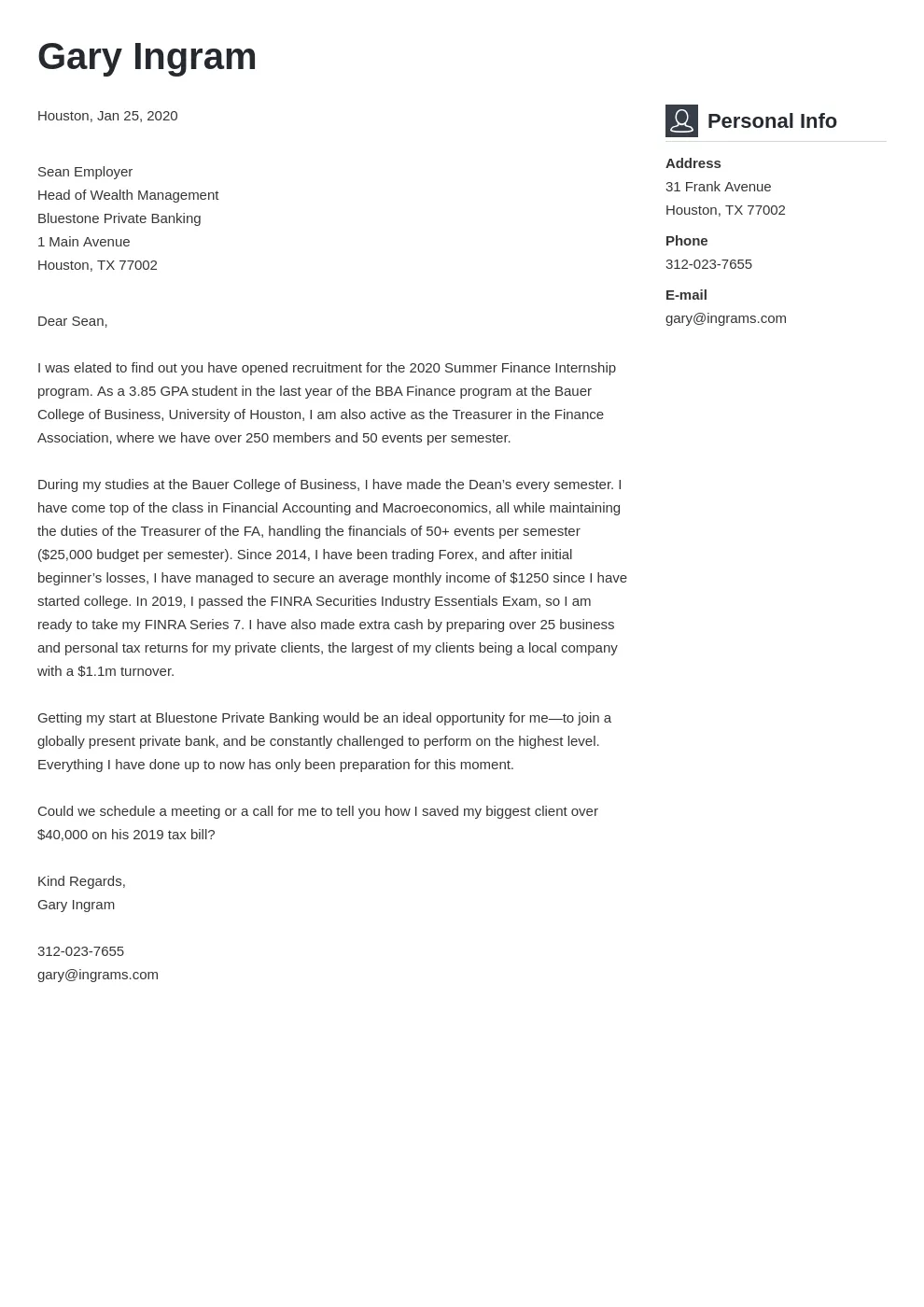
To stand out from the crowd, go beyond the basics. This can be through formatting your letter correctly, using action verbs to make your points, and showcasing your achievements with data. Including a professional portfolio or links to relevant online profiles can help you, but it is important to ensure that your online presence is professional. Researching the company and highlighting its mission in your letter will help set you apart, since this shows you are genuinely interested. Tailoring your cover letter for each job and avoiding generic statements is also essential. By using these strategies, you can present yourself as a top candidate and increase your chances of getting an interview.
Using Action Verbs
Action verbs make your cover letter more dynamic and compelling. They show that you are proactive and results-oriented. Replace passive language with strong action verbs. Instead of ‘Responsible for managing accounts,’ write ‘Managed accounts, resulting in a 10% reduction in overdue payments.’ Use a variety of verbs to describe your achievements and responsibilities. Examples include ‘analyzed,’ ‘developed,’ ‘implemented,’ ‘managed,’ ‘achieved,’ and ‘improved.’ These verbs highlight your accomplishments and capture the hiring manager’s attention. Using strong action verbs can give you a big advantage by making your cover letter more vivid and showing a direct connection between your skills and accomplishments.
Show, Don’t Tell
Demonstrate your skills and abilities rather than simply stating them. Provide specific examples to support your claims. If you are proficient in financial modeling, describe a project where you built a model to analyze a business opportunity. Explain the steps you took, the tools you used, and the results you achieved. Instead of saying, ‘I am a strong leader,’ describe a situation where you led a team to successfully complete a challenging project. Showcasing your capabilities through concrete examples makes your claims more believable and more memorable. The use of clear examples also helps the hiring manager easily assess your qualifications and suitability for the role.
Formatting Your Cover Letter for Readability
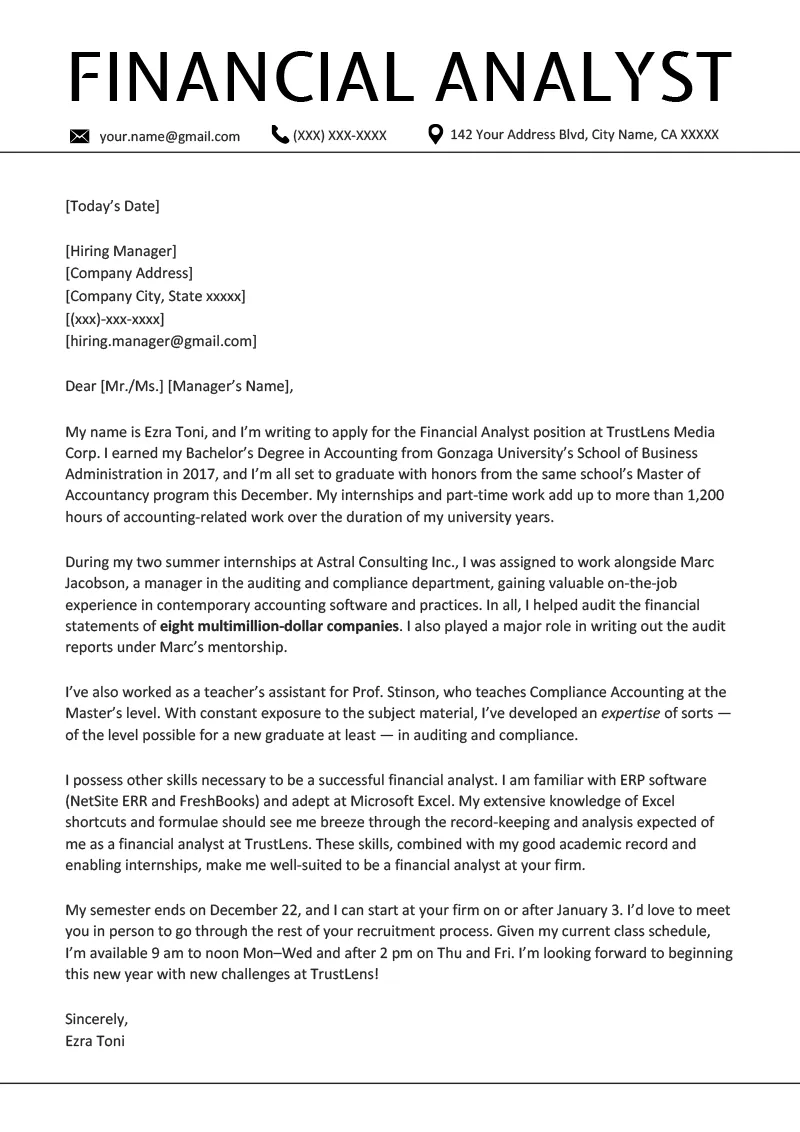
A well-formatted cover letter is easy to read and makes a good impression. Use a professional font, such as Times New Roman, Arial, or Calibri. Choose a font size between 10 and 12 points for optimal readability. Use one-inch margins on all sides and single-space your text, with a double space between paragraphs. Use clear headings and bullet points to break up large blocks of text and highlight key information. Ensure your cover letter is visually appealing and easy to navigate. A clean, well-organized format demonstrates your attention to detail. Your cover letter should be well-structured and easy to read. This makes it easier for the hiring manager to understand your qualifications. Also, a professional format increases the likelihood of a positive response to your application.
